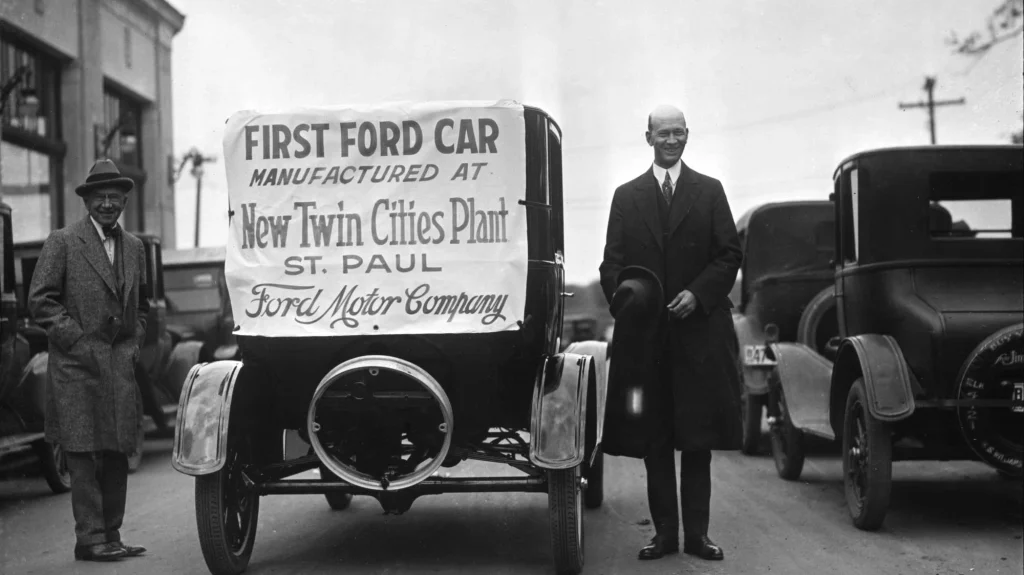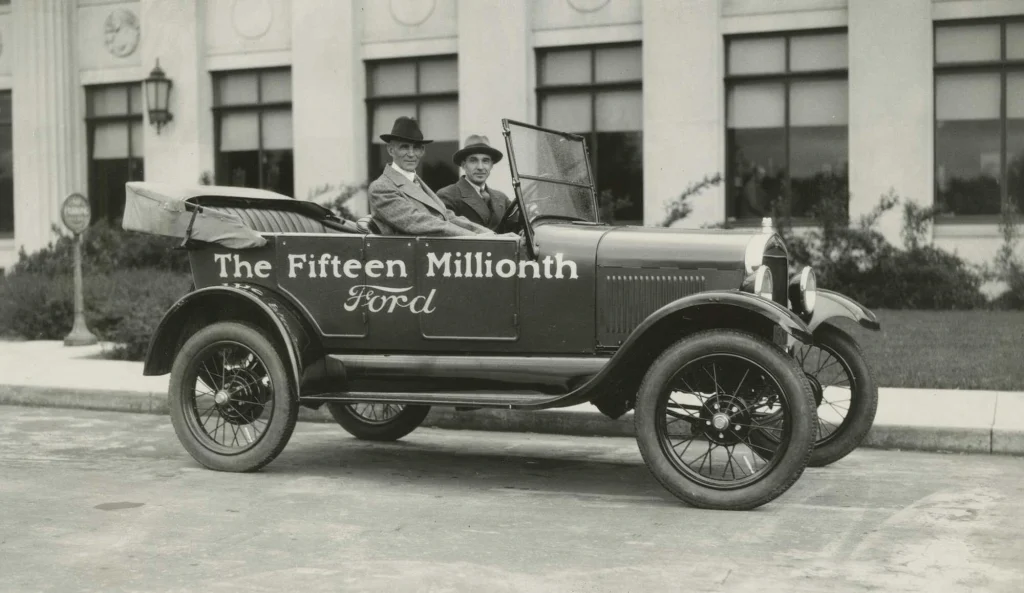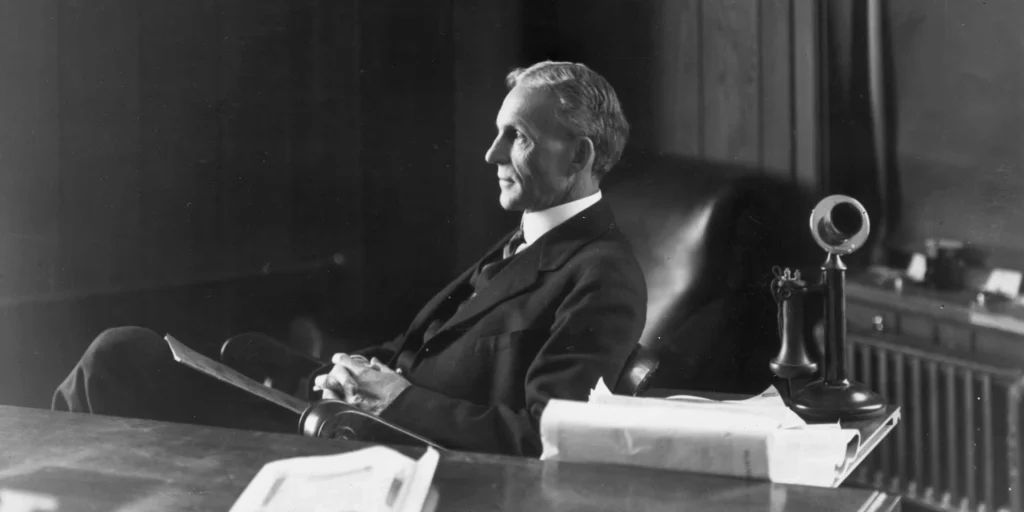
Introduction: The Power of One Bold Decision
Have you ever thought about how one decision could change the course of history? In the early 20th century, a single bold move by one man didn’t just revolutionize the way we move—it transformed the way we live, work, and rest. That man was Henry Ford.
You probably know him as the automobile pioneer who gave us the Model T and the assembly line, but what if we told you Ford also invented your weekend?
Yes—Ford’s one decision changed transportation forever and gave birth to the two-day weekend. His vision wasn’t just about building cars; it was about building a better world for workers and consumers alike.
This is the complete, detailed story of how Henry Ford’s vision redefined modern life—from the factory floor to your Saturday morning freedom.
Who Was Henry Ford?
The Man Who Dared to Think Differently
Born on July 30, 1863, in Greenfield Township, Michigan, Henry Ford was not destined to be an ordinary man. Raised on a farm, young Ford was fascinated with mechanics, not crops. From the time he was a teenager, he began dismantling watches and engines to understand how things worked.
By the late 1800s, he was working at Edison Illuminating Company, where he rose to the role of chief engineer. But it was after hours that the real magic happened—Ford spent his evenings crafting his vision of a gasoline-powered vehicle that would eventually disrupt the world.
In 1903, he founded the Ford Motor Company, and five years later, the Model T was born. This car wasn’t just a vehicle—it was a revolution on wheels.
But Ford’s genius went far beyond machines. His approach to labor, productivity, and human happiness would shake the foundations of industrial capitalism.
Ford’s First Revolution: Changing Transportation Forever
The Model T: Mobility for the Masses
When the Model T was launched in 1908, cars were luxury items for the rich. But Ford had a radical idea—build a car so affordable that every working family in America could own one.
He succeeded.
Thanks to innovative mass production, including the moving assembly line introduced in 1913, Ford slashed the production time per car from 12.5 hours to just 93 minutes. That wasn’t just efficient—it was history-making.

By making cars accessible, Ford:
- Empowered middle-class mobility
- Fueled urban expansion
- Created the modern commuting culture
- Supported road infrastructure development
- Expanded industries like oil, rubber, steel, and motels
Over 15 million Model Ts were sold. The phrase “Ford put the world on wheels” is not an exaggeration—it’s a fact.
Ford’s Second Revolution: Reinventing the Workweek
Why Did Henry Ford Implement a Two-Day Weekend?
By the 1920s, Ford’s factories were producing at lightning speed—but the workers were exhausted. Most American laborers worked six days a week, often more than 10 hours per day. Sunday was the only day of rest.
In 1926, Ford made a move that shocked the industrial world:
He implemented a five-day, 40-hour workweek—without cutting pay.
Yes, Henry Ford gave his workers Saturdays and Sundays off.
And he didn’t do it out of kindness. It was a strategic business decision.
Let’s break down his reasons:
1. Fatigue Was Killing Efficiency
Ford realized that tired workers made more mistakes and took longer to do tasks. On an assembly line, that meant wasted time, wasted materials, and frustrated supervisors.
Giving workers time to rest and recharge meant
- Fewer errors
- More focus
- Increased long-term productivity
“The country is ready for the five-day week,” Ford declared. “It is bound to come through all industry.”
2. Happy Workers Stay Longer
In 1914, Ford had already doubled wages to $5 per day, attracting top talent and reducing turnover. But that wasn’t enough.
By offering a shorter workweek, he made Ford Motor Company the most sought-after employer in America.
Instead of unions demanding change, Ford was giving workers more than they even asked for—before being pressured to.
3. More Free Time = More Spending
Here’s where Ford’s genius really shines.
More time off means
- More time to shop
- More time to travel
- More time to drive
Ford understood that the weekend wasn’t just a benefit—it was an economic engine.
If workers had two days off, they’d want to use their cars—and guess who sold them those cars? Ford.
He literally built demand for his own product by giving people time to use it.
The Ripple Effect of Ford’s Weekend Decision
Ford’s competitors laughed at first. Then they watched in shock as
- Ford’s profits increased
- Productivity surged
- Public perception soared
Soon, General Motors, Chrysler, and others had no choice but to follow. Ford had reset the standard.
By 1938, the U.S. government passed the Fair Labor Standards Act, officially cementing the 40-hour workweek into federal law.
But it all began with Ford.

How the Two-Day Weekend Reshaped Society
A New Culture of Rest, Recreation, and Consumerism
The moment Americans had Saturdays off, a cultural explosion occurred.
Leisure Became an Industry
- Sports attendance boomed
- Movie theaters became weekend hotspots
- Amusement parks, resorts, and malls emerged
Cars Became Weekend Essentials
People used weekends to:
- Visit relatives
- Go on road trips
- Explore nature
- Attend community events
The family car became the centerpiece of the weekend lifestyle.
Work-Life Balance Was Born
Though the term didn’t exist then, Ford’s idea planted the seed for
- Better mental health
- Stronger families
- Increased satisfaction
Ford’s Legacy: Beyond the Assembly Line
The Man Who Engineered Time Itself
Henry Ford is often called a visionary industrialist, and rightly so. But he was more than just a business tycoon—he was a human engineer.
He understood.
- People need rest to work well.
- Time is as important as money.
- A strong workforce builds a stronger company.
His innovations in labor weren’t accidents—they were intentional social engineering. His goal? A more productive economy built on healthier humans.
FAQs: Unpacking Ford’s Weekend Revolution
Did Henry Ford invent the weekend?
No—but he popularized the two-day weekend by being the first major industrialist to implement it on a mass scale.
Was the move successful?
Incredibly. It improved worker productivity, reduced turnover, and increased consumer demand for cars and leisure.
Is the weekend under threat today?
With remote work, hustle culture, and global time zones, some argue the weekend is becoming blurry. But Ford’s core idea remains: workers need rest to thrive.

The Bottom Line: Ford Changed More Than Just Cars
Henry Ford didn’t just invent a better way to build cars—he invented a better way to live.
By slashing hours and giving workers their weekends, he:
- Humanized labor
- Boosted the economy
- Reshaped global work culture
- Built consumer society
So next time you hop in your car on a Saturday, drive to the mall, or plan a family trip, remember:
You’re not just enjoying a day off—you’re living Henry Ford’s vision.
Ford’s one decision didn’t just move machines. It moved the world.


